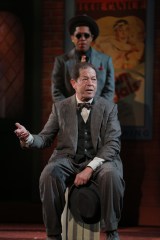If there are summer evenings in Manhattan that seem, almost by design, perfect for outdoor theater, last Saturday was one of them. Indeed, a house packed with rapt, moonlit faces watched the Public Theater’s Shakespeare in The Park production of The Comedy of Errors, a mistaken-identity farce in which two sets of twins, separated in youth, inadvertently sow chaos and confusion on the Greek town of Ephesus.
The audience is eager; many have spent six hours waiting in line for the box office to open, while others have shown up an hour before curtain to see if they can coax an extra ticket (or two) from those who have either changed their minds (or, worse, have been stood up). There’s something comforting—even endearing—about seeing hundreds fight over tickets to see Shakespeare on a weekend night.
Director Daniel Sullivan has relocated the play, temporally and geographically, to 1940s America. The primary set is a charmingly Disney-esque village filled with jukeboxes, dance clubs, and mobsters in double-breasted suits. The Duke of Ephesus is played as an inarticulate and overly sentimental Crime Boss. An Eddie Cantor poster hangs in the background.
The two sets of twins, one of each is named Antipholus (played by Hamish Linklater), and the other, their servants, both named Dromio (Jesse Tyler Ferguson) have been unknowlingly reunited in Ephesus; one of the Antipholus’ wives even mistakenly preys on his estranged twin, who, though confused, decides to play along with what seems to be his good fortune.
This production’s greatest accomplishment is, perhaps, that it doesn’t take itself too seriously. Shakespeare’s comedies are too often treated with a stern and misguidedly shallow studiousness — I have seen countless productions that seem dry and distant (and contribute to the notion that only a select few can really, truly enjoy Shakespeare).
This production was neither dry nor distant; quips are delivered expertly—the verse itself feels so deftly and delightfully modern that it becomes almost impossible to believe the original text wasn’t amended to suit our contemporary sensibilities. This isn’t, of course, to say that the production cheapens the text. Director Sullivan, understands the timeless humor in the line: “No longer from head to foot than from hip to hip: she is spherical, like a globe; I could find out countries in her.”
And yet in the middle of the Scooby-Doo door-chasing scene that is this entire play, there are those moments of high art, too. And we are reminded, after all, of the play’s author. As the unwed Antipholus tries to court his brother’s sister, he delivers verses worthy of Romeo hiding behind a curtain at the Capulet ball. One cannot help wonder why such lines exist in a play that is abounds with puns and obscenity and slapstick humor (Dromio tries to knock down a door with a serving spoon and accidentally breaks a baguette over Antipholus’ head).
How is it that the poetry itself doesn’t seem out of place? Something in the very juxtaposition itself must have fascinated Shakespeare, and this production seems to have understood and adopted Shakespeare’s fascination well: as Antipholus’ delivers a long and moving final speech that invites a wave of applause from the audience, Dromio, stands in the corner demurely and excitedly clapping too, until he awkwardly and embarrassedly realizes his unabashed outburst was hilariously out of place.
Perhaps what is so charming about a good production at Shakespeare in The Park is that through it we are given the opportunity to be almost removed from time: we burst out at the very same punch lines and witticisms that sent waves of laughter through an arena four centuries ago. And it’s a rare gift to make an audience laugh at jokes that are 400 years old; it’s even rarer to let an audience forget exactly how old those jokes are.


